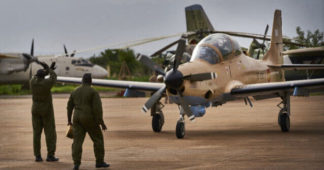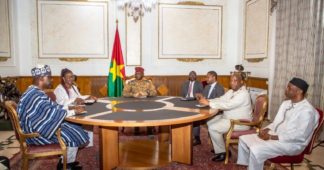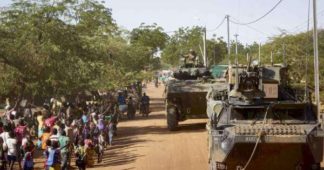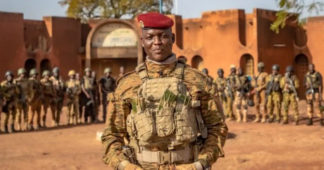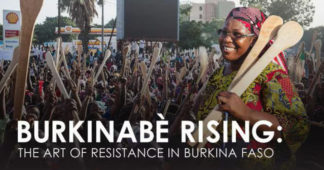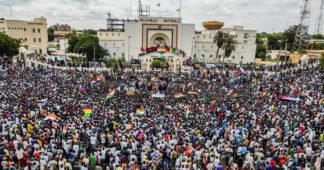By Isaac Bazié (*)
West Africa is currently at the heart of a highly volatile situation. Since July 26, 2023, Niger has joined the category of military-led countries after Mali, Chad, Guinea and Burkina Faso. The recent change in Niger has revealed, even more clearly, opposing fronts: the defenders of the constitutional order, whose protection would require the return of the sequestered president Mohamed Bazoum, even if this would have to be at the cost of military intervention under the command of ECOWAS; the other front has a heterogeneous composition; it gathers those who defend the coup de force, and those who reject it without demanding at all costs the reinstallation of the former president. Even among the defenders of constitutional order, there is no unanimity on use of force to restore the elected president to office.
Among the countries in military transition, Burkina Faso recently recorded two coups d’état in 2022: On January 24, 2022, a coup d’état overthrew President Roch Marc Christian Kaboré and allowed Lieutenant-Colonel Paul-Henri Sandaogo Damiba to take power; eight months later, on October 2, 2022, a second coup ended President Damiba’s short-lived reign. Leadership of the country is taken over by President Ibrahim Traoré, against a backdrop of insecurity due to the terrorist attacks that have made the country insecure since 2016.
Since his speech at the recent Russia-Africa Summit in St. Petersburg, President Ibrahim Traoré has been creating a buzz when he advocated for political, economic, and cultural sovereignty for his country and Africa. The welcome he received on his return to Ouagadougou is a visible sign of strong support from the Burkinabè people, in contrast to the very negative analyses of the military nature of his regime outside Burkina Faso, especially in France and the West. How can we explain that the people of Burkina Faso did not demonstrate against the coup d’état that ended the “democratically elected” president’s second term in office in January 2022? How to explain that President Ibrahim Traoré, who came to power through a coup d’état, enjoys the kind of popular support that any politician would dream of in election time?
An impatient request for results in the fight against terrorism
At the time of the first coup d’état in Burkina Faso (January 2022), the country was still mourning the death of over fifty soldiers whose camp has been attacked by a terrorist group in November 2021. In the eyes of the Burkinabè population, the Inata tragedy was overwhelming proof of the inability of the country’s political leaders and their foreign backers, notably France, to contain or even eradicate the country’s growing insecurity. Little wonder that weeks later, few people were inclined to regret the president-elect, even if, for the sake of propriety, they refrained from praising the coup d’état that had overthrown him. It also explains why, eight months later, when a second coup d’état took place for the same reasons: President Ibrahim Traoré and his team were given a chance to resolve the problem of insecurity and the loss of control over large parts of the national territory. It is easy to understand that, for the populations suffering from insecurity, the President’s legitimacy is not a question of elections or a coup d’état, but a question of results on the ground in the fight against jihadism, bad governance, corruption, and impunity.
A predominantly young population in search of a future
Insecurity in Burkina Faso is a relatively recent fact, which explains the changes of government in 2022. It is not sufficient to explain the political upheavals that have shaken the country in its recent history. A brief look back at these events should help understand: After ending abruptly the revolution led by his companion Thomas Sankara (1983-1987), Blaise Compaoré attempted in 2014 to amend the constitution in order to run for a third term and extend his twenty-seven-year reign at the head of Burkina Faso. On those memorable October days in 2014, thousands of Burkinabè demonstrated their opposition to this constitutional coup, forcing Blaise Compaoré to step down from power in broad daylight; he was exfiltrated by France to Côte d’Ivoire. The popular uprising of 2014 was the sign of a tiredness against corruption, impunity and lack of perspective in a population of which 77.9% are children and young people aged under 35.
On the crisis of elective democracy: What’s behind the sub-Saharan Harmattan?
Harmattan is a dry, hot wind that blows from the Sahara southwards and even troubles coastal countries in West Africa. This wind blows in a transitional period after the harvest and before the next rainy season; the harmattan brings with it its share of dust, daytime heat and night-time cold, as well as its share of disease. It’s also a symbol of a time of transition and turmoil, like that of the independence era in 1958-1960. The political harmattan currently blowing in Burkina Faso is the result of several processes that have reached their historical maturity: the first is that of partial decolonization in the 1960s, which showed its limits in the facade independence of French-speaking countries that remained economically and politically under the influence of their former colonizer, France; the second process nourishing this harmattan is related to the first: the imposition of elective democracy, which has been implemented without any popular base or political education, and which military men like Blaise Compaoré were able to use to keep themselves in power, democratically for 23 years! During these decades, Burkina Faso has been evaluated as a “stable” country, without the same people who today are indignant about coups d’état being seriously concerned about the conditions of governance, justice and equity in the country. One should remember that if the Burkinabè had not taken to the streets to put an end to this too long president’s reign, he would have carried out his constitutional coup d’état and remained in power for at least one more term; this is what some ECOWAS presidents, who today defend “democracy”, have managed to do in their own countries, or have tried to do without success.
The sanctions policy makes countries like Burkina Faso more innovative on their way to sovereignty. What most Western, particularly French mainstream media don’t show – except the terrorist attacks – is the tremendous mobilization of the majority of Burkinabè people behind the army and President Ibrahim Traoré in his fight for territorial integrity, political sovereignty, social justice and economic development.
The sub-Saharan Harmattan is a hot political wind blowing over some countries (Mali, Guinea, Tchad, Niger). It feeds on the bitter fruits of neo-colonialism whose make-up has cracked, but it also feeds on exasperation against local leaders who are not taking urgent action to responding to the pressing challenges of development, good governance, social justice and insecurity. This hot wind doesn’t care about national postcolonial borders, nor does it spare “elected presidents” or “historic partners” (neo-colonial, imperialist powers).
In a word, the sub-Saharan harmattan conceals an irreversible historical turning point. No one can exactly predict what will come up after the dust of the political harmattan will settle. But for sure, nothing will ever be the same again.
(*) Professeur titulaire, Département d’études littéraires
Directeur, Laboratoire des Afriques Innovantes (LAFI) – https://lafi.uqam.ca
Directeur/Chief Editor, Revue Afroglobe. Penser l’Afrique, dans une perspective locale et globale. / Journal Afroglobe. African Issues, in local and global Perspectives.
We remind our readers that publication of articles on our site does not mean that we agree with what is written. Our policy is to publish anything which we consider of interest, so as to assist our readers in forming their opinions. Sometimes we even publish articles with which we totally disagree, since we believe it is important for our readers to be informed on as wide a spectrum of views as possible.
